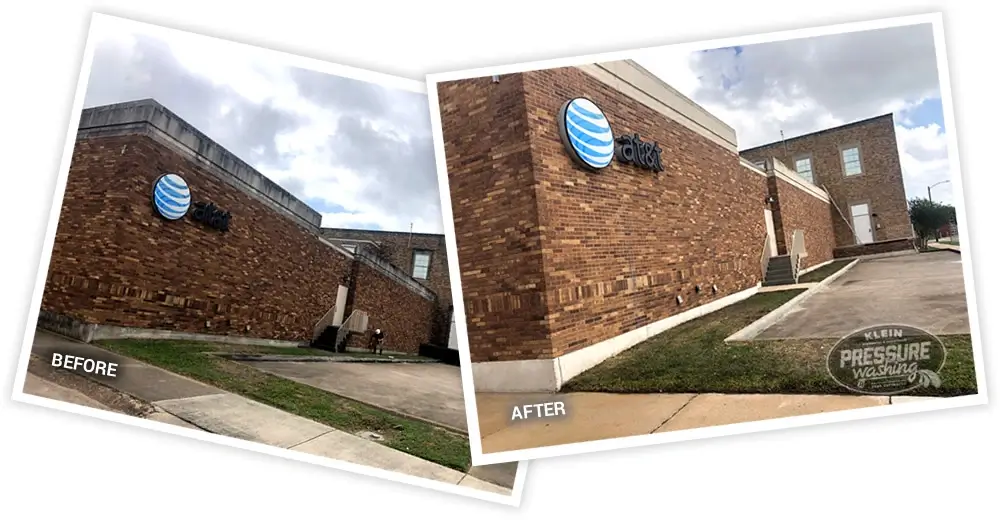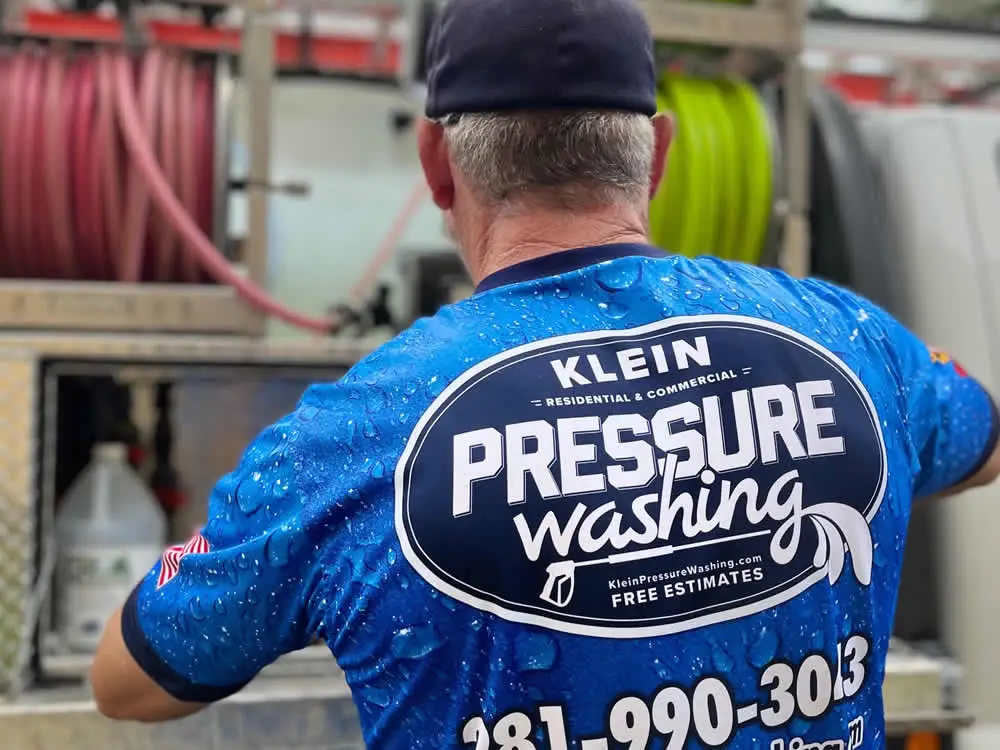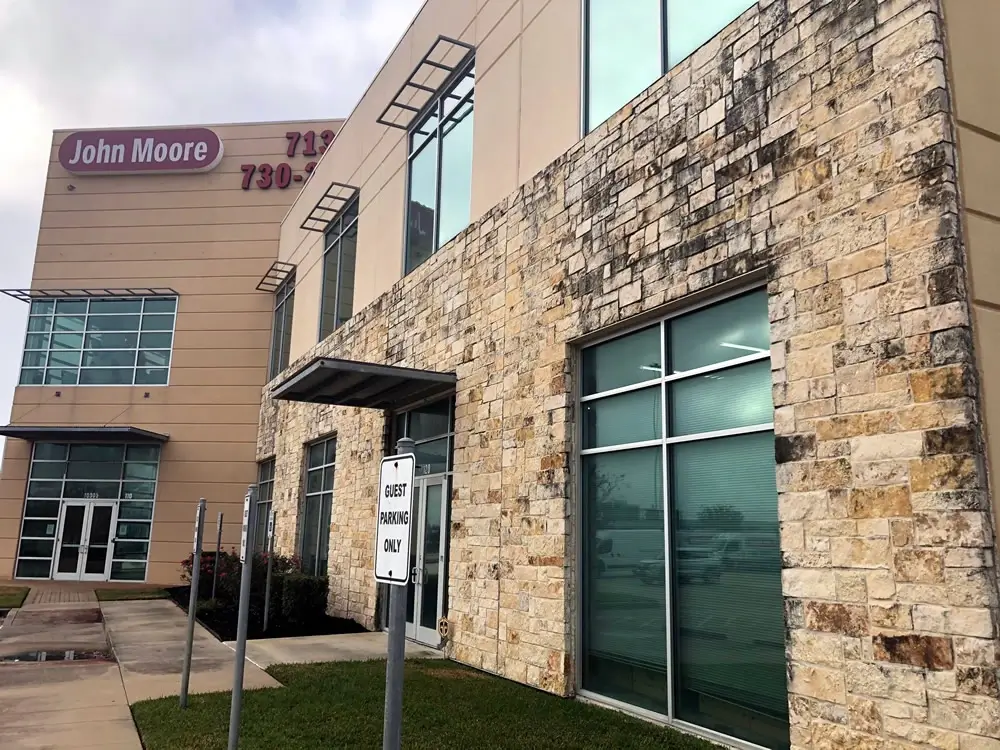Pressure Washing for Commercial Buildings: A Comprehensive Guide

Introduction
Hey Houston business owners!
Your building's exterior tells a story about your business – what story is yours telling?
If you've noticed dark streaks down your walls, green algae creeping up from the foundation, or parking lots that look more like abstract art from oil stains, you're not alone. Houston's humid climate creates perfect conditions for mold, mildew, and algae growth. Add in our industrial environment and frequent storms, and building exteriors take a real beating.
But here's the good news: professional pressure washing can restore your property's appearance and protect your investment. This guide breaks down everything you need to know about pressure washing commercial buildings in the Houston area.
Why Your Building's Appearance Matters More Than You Think
First Impressions Count
When potential tenants, customers, or business partners drive up to your building, they form an opinion within seconds. A clean, well-maintained exterior signals:
- Professional management
- Attention to detail
- Quality business operations
- Pride in the property
The Houston Climate Challenge
Our unique weather patterns create specific challenges:
- High humidity promotes mold and mildew growth
- Frequent storms leave debris and water stains
- Industrial activity deposits pollutants on surfaces
- Salt air (for coastal properties) accelerates deterioration
I've seen buildings lose significant value simply because owners ignored exterior maintenance. One office complex in the Galleria area lost three potential tenants in one month – all cited the "unprofessional appearance" of the algae-covered exterior.
What's Actually Growing on Your Building?

Black Algae on Vertical Surfaces
Those dark streaks you see on buildings are typically Gloeocapsa magma, also known as black algae. This type of cyanobacteria feeds on the asphalt filler in shingles and roof materials. While it doesn't cause immediate damage, it can make buildings appear decades older than they actually are. The algae thrives in Houston's humid climate, spreading through airborne spores and settling on damp, shaded surfaces where it can grow.

Black Algae on Concrete

Efflorescence

Rust

Graffiti
DEFINITIONS:
As you review this article, we'd like to define some terms to eliminate any confusion. "Power washing, pressure washing, and soft washing" is often used interchangeably within this industry. However, there are some key differences:
power washing = pressure washing
power washing = soft washing
pressure washing ≠ soft washing
OR TO PUT IT ANOTHER WAY:
power washing = high pressure, moderate pressure & low pressure
pressure washing = high pressure & moderate pressure
soft washing = low pressure
Whether you are looking to improve or maintain the appearance of your building, extend its lifespan, or protect it from mold and mildew growth, this guide will provide the information you need to make an informed decision.
The Real Benefits of Professional Pressure Washing
Property Value Protection
Clean buildings maintain their value better. Property managers report that regular cleaning schedules help:
- Reduce major repair costs
- Extend material lifespan
- Maintain competitive rental rates
- Attract quality tenants faster
Health and Safety Benefits
Regular cleaning removes:
- Slip hazards from algae on walkways
- Allergens that affect indoor air quality
- Pest attractants like food residue and organic matter
Tenant Satisfaction
Clean buildings lead to:
- Higher lease renewal rates
- Fewer maintenance complaints
- Better online reviews
- Word-of-mouth referrals
Professional vs. DIY: Why It Matters
Equipment Differences
Professional teams use:
- Hot water systems (up to 200°F) for better cleaning
- Variable pressure controls to protect different surfaces
- Professional-grade chemicals not available to consumers
- Surface cleaners for even, streak-free results
Training and Experience
Professional technicians understand:
- Which surfaces need soft washing vs. pressure washing
- Proper chemical mixing and application
- How to protect landscaping and building features
- Safety protocols for working at height
Insurance and Liability
Professional services provide:
- General liability coverage
- Workers' compensation protection
- Bonding for your protection
- Warranty on work performed
Cost Considerations
While DIY seems cheaper initially, consider:
- Equipment rental costs ($100-300+/day)
- Chemical purchases
- Time investment (often 2-3x longer)
- Risk of damage from inexperience
- No warranty if something goes wrong
Impact of Pressure Washing on Appearance

Moreover, pressure washing can enhance the aesthetic of the surrounding property by removing any unsightly marks or stains on sidewalks, parking lots, and other outdoor surfaces. This results in a well-maintained, inviting property that exudes a positive image.
Regular pressure washing not only ensures the building's immediate cleanliness and fresh look but also helps to prevent future buildup of contaminants, maintaining its attractive appearance for the long term.

Benefits of Professional Pressure Washing Services

Understanding Pressure Washing Equipment

Pressure Washers
Gas-powered units are best for commercial work:
- 3,000-4,000 PSI capability
- 5-12 GPM (gallons per minute) flow rate
- Hot water capability for tough stains such as gum and petroleum-based solvents
- Truck-mounted systems for unlimited runtime
Electric units work for smaller areas but lack the power for efficient commercial cleaning.

Surface Cleaners
These rotating attachments provide:
- Even cleaning patterns
- Faster coverage than wand cleaning
- Better results on flat surfaces
- Reduced streaking

Soft Wash Systems and the Pumps Used
For delicate surfaces like painted siding or roof cleaning:
- Low pressure (under 100 PSI)
- Chemical-based cleaning
- Gentle on materials

Understanding the different types of pumps used can help businesses choose the right equipment for the job.
12 & 24V Electric Diaphragm Pumps:
A 12V diaphragm pump is a type of pump commonly used in soft washing systems. It operates by using an electrical motor to drive a diaphragm that moves back and forth to generate pressure and flow. The 12V designation refers to the voltage of the electrical power required to operate the pump. This type of pump is often used for smaller, portable soft washing systems as it is lightweight and easy to transport. The advantage of using a 12V diaphragm pump is its portability and ease of use, making it a popular choice for contractors who need to move from job to job. However, the lower voltage may limit its power and flow rate compared to other types of pumps.
120V Booster Pumps:
A 120V booster pump is an electrically-powered pump used in soft washing systems to increase water pressure and flow rate. The pump is connected to a power source and increases the pressure of water from a low-pressure source, such as a garden hose, to the desired pressure level needed for soft washing. This pump can be used in residential, commercial and industrial settings to effectively clean surfaces and remove contaminants. The advantage of using a 120V booster pump is its portability and ease of use. However, it may not be suitable for larger commercial or industrial cleaning projects that require a higher water flow rate and pressure.
Air Diaphragm Pumps:
An air diaphragm pump is a type of pump commonly used in soft washing for pressure washing systems. It uses compressed air to move the diaphragm and pump water, making it a versatile option for various applications. The air diaphragm pump is known for its ability to handle viscous liquids, high volume output and low-pressure pumping capabilities, making it an ideal choice for soft washing.
Gas Powered Soft Wash Pumps:
Gas powered soft wash machines are high-powered machines that are ideal for large commercial buildings due to their high power output. They are versatile and can handle multiple tasks, making them a popular choice for pressure washing contractors. .
Importance of Choosing the Right Pressure Washing Equipment
Choosing the right pressure washer is critical for ensuring that cleaning tasks are completed effectively and efficiently. Here are some of the most important factors to consider when choosing a pressure washer:
By considering these factors and choosing the right pressure washer for the job, property owners can ensure that their cleaning tasks are completed effectively and efficiently. This will help to save time, money, and resources, while also ensuring that their property looks its best.
Chemical Solutions: What Works and Why
Sodium Hypochlorite (Bleach)
- Kills mold, mildew, and algae
- Brightens surfaces
- Must be properly diluted
- Requires plant protection and runoff management
Sodium Hydroxide (Caustic)
- Breaks down grease and organic matter
- Excellent for restaurant exteriors
- Neutralization required after use
Oxalic Acid
- Removes rust stains
- Brightens concrete
- Restores original surface color
Surfactants
- Reduce surface tension
- Help chemicals penetrate better
- Improve cleaning efficiency
Other Chemical Classifications Include:
By selecting the right type of chemical and applying it correctly, power washing and soft washing professionals can effectively clean a variety of surfaces and tackle a range of grime and buildup.
Safe Handling of Chemicals: 6 Guidelines
Chemicals play an important role in many cleaning processes, including pressure washing. However, it's essential to handle these chemicals safely to avoid injury and protect the environment. Here are 6 guidelines for the safe handling of chemicals:
- Read the Label: Always read the label before using any chemical. This will provide important information about how to use the product safely and effectively.
- Wear Protective Gear: Protective gear, such as gloves and eye protection, should always be worn when handling chemicals. This helps to prevent skin and eye irritation or injury.
- Store Chemicals Properly: Chemicals should be stored in a cool, dry place away from heat sources, sparks, and open flames. Make sure they are out of reach of children and pets.
- Avoid Mixing Chemicals: Mixing chemicals can be dangerous and even deadly. Always use chemicals as directed and never mix them unless instructed to do so.
- Use Only in Well-Ventilated Areas: Chemicals can produce harmful fumes, so it's important to use them in well-ventilated areas to prevent inhaling dangerous fumes.
- Dispose of Chemicals Properly: Dispose of chemicals according to the instructions on the label. Do not pour them down the drain or into the ground, as they can pollute the environment.
By following these guidelines for safe handling of chemicals, property owners can protect themselves, their employees, and the environment. By taking the necessary precautions, they can ensure that their building is cleaned effectively and safely.
Other Safety Considerations You Can't Ignore
Protective Equipment
Professional teams wear:
- Safety glasses and face shields
- Chemical-resistant gloves
- Non-slip footwear
- Protective clothing
Environmental Protection
Proper procedures include:
- Pre-wetting and covering plants
- Controlling runoff and drainage
- Using eco-friendly chemicals when possible
- Following local water use regulations
Electrical Safety
Key precautions:
- Identifying electrical panels and outlets
- Maintaining safe distances
- Using GFCI protection
- Turning off power when necessary

Choosing the Right Pressure Washing Service
Questions to Ask Potential Contractors
Are you licensed and insured?
- General liability minimum $1 million
- Worker's compensation coverage
- Local business license
What's your experience with commercial properties?
- Ask for references from similar buildings
- Request before/after photos
- Inquire about problem-solving experience
What chemicals do you use?
- Eco-friendly options
- Proper dilution procedures
- Plant and property protection methods
Do you offer maintenance programs?
- Scheduled cleaning intervals
- Priority scheduling
- Volume discounts
Red Flags to Avoid
- Door-to-door solicitation
- Unusually low prices
- No written estimates
- Lack of insurance documentation
- Pressure for immediate decisions
Maintenance Scheduling for Houston Properties
High-Traffic Buildings
- Retail centers: Quarterly cleaning
- Restaurants: Monthly cleaning (especially dumpster areas)
- Medical facilities: Bi-monthly cleaning
- Schools and churches: Annually
Standard Office Buildings
- Annual full building wash
- Bi-annual spot cleaning for problem areas
- Quarterly sidewalk and entrance cleaning
Industrial Properties
- Monthly equipment areas
- Quarterly building perimeter
- Annual full facility cleaning
Cost Factors and Budgeting
Pricing Variables
- Building size (square footage)
- Building height (equipment and safety requirements)
- Surface types (different materials require different approaches)
- Contamination level (heavy buildup takes longer)
- Accessibility (obstacles increase labor time)
Typical Houston Market Rates
- Basic building wash, Lowrise: $0.15-0.75+ per square foot
- Concrete cleaning: $0.09-0.35 per square foot
- Parking garage cleaning: $0.25-0.40 per square foot
- Graffiti removal: price based on multiple variables (size, number of layers, accessibility, surface material, etc..)
Budget Planning Tips
- Schedule regular maintenance to avoid emergency cleaning costs
- Bundle services for volume discounts
- Plan around the weather to avoid storm damage markups
Getting Started: Your Next Steps
Initial Assessment
- Walk your property with fresh eyes
- Document problem areas with photos
- Identify safety concerns like slippery walkways
- Note tenant or customer complaints about building appearance
Finding the Right Contractor
- Research local companies with commercial experience
- Request multiple quotes for comparison
- Check references from similar properties
- Verify insurance and licensing
Planning Your Program
- Start with a thorough initial cleaning
- Establish a maintenance schedule based on your building's needs
- Budget for regular service to avoid costly emergency cleaning
- Monitor results and adjust frequency as needed
Planning Your Program
- Start with a thorough initial cleaning
- Establish a maintenance schedule based on your building's needs
- Budget for regular service to avoid costly emergency cleaning
- Monitor results and adjust frequency as needed
Final Thoughts and Recommendations
Your commercial building is more than just a place to do business – it's a reflection of your standards and an investment in your future. Regular pressure washing protects that investment while creating an environment where tenants want to stay and customers want to visit.
Houston's climate makes building maintenance challenging, but with the right approach and professional help, you can keep your property looking its best year-round. The key is consistency, quality service, and working with contractors who understand both the technical and business aspects of commercial property maintenance.
Remember: the cost of maintenance is always less than the cost of replacement. Start planning your building's cleaning program today, and you'll see the benefits in both appearance and value for years to come.
Schedule a Pressure Washing Appointment
Share this Post
Share this Post




